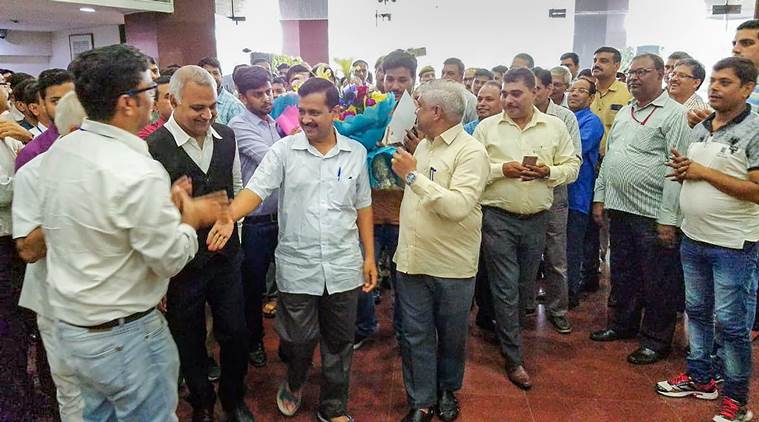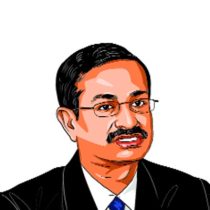Class act
Supreme Court judgment will enhance the AAP government’s appeal in Delhi, especially among poor.

Arvind Kejriwal at the Delhi Secretariat on Wednesday. (Source: Twitter)
The AAP government had become somewhat unpopular in Delhi in recent years. The euphoria of voting for the party, and more so for Arvind Kejriwal, had vanished to a great extent, especially among Delhi’s middle-class voters who rallied around the party in a big way during the 2013 and 2015 assembly elections. However, the AAP government continues to be popular among the lower and the poorer class voters of Delhi: They had voted for the AAP in large numbers in 2015.
The vocal middle-class, now disillusioned with the AAP government, has created the illusion that the party has completely lost ground in Delhi. The reality is that class fissures in Delhi’s politics that started to appear with the emergence of the BSP during the 2003 and 2008 assembly elections are now settled, with the poor and the lower class voters siding with the AAP and the middle and upper class voters preferring the BJP and the Congress. The work done in school education and public health has made the AAP government popular among the lower classes and the poor of Delhi.
The poor and the lower classes constitute a sizeable majority of Delhi’s voters. Surveys conducted by the Centre for the Study of Developing Societies (CSDS) in Delhi estimate that the two classes together make up about 60 per cent of the total voters. If elections are held for assembly elections, the AAP will retain power, though with a much smaller majority, due to the enormous support it has among these sections. Recent CSDS surveys indicate that the AAP is still the front-runner for office in Delhi; the preference of the same voters in a Lok Sabha election is different.
The recent judgment of the Supreme Court on the powers of the Delhi government and the lieutenant governor may not increase the popularity of the AAP among the middle and upper classes, but it certainly gives legitimacy to the party’s allegations that the LG unnecessarily interferes in the functioning of the elected government, at times making it impossible for them to take development work forward.
Sections of middle and upper class voters got disenchanted with the AAP for several reasons, one of them being AAP ministers constantly complaining that the LG was not letting them work. A large number of people believed that the party was trying to cover up its inability, inefficiency and inexperience. The Supreme Court judgment may help tackle the disillusionment of the middle classes against the Kejriwal government. The respect for institutions has been declining in India in recent years, but respect for the Supreme Court continues to be very high. Trust in the Supreme Court, according to CSDS surveys, is as high as 65 per cent. So, people are bound to take this judgment seriously and see it without any political prejudice.
The judgment, in itself, seems balanced, which will compel people to read it in the right spirit. The five-judge bench of the SC unanimously held that Delhi LG is bound by the “aid and advice” of the elected government and both have to work together. It noted that there is no room for anarchy or absolutism in a democracy. Justices A K Sikri and A M Khanwilkar held that except in matters concerning public order, police and land, the LG is bound by the aid and advice of the government. Justice D Y Chandrachud observed that “real authority to take decisions lies in the elected government.
This is the real meaning of ‘aid and advice’. Titular head has to act in accordance.” He also concluded that there is no independent authority with the LG to take decisions except in matters under Article 239 or those outside the purview of the National Capital Territory government. Justice Chandrachud further added that elected representatives would be reduced to a cipher if “any matter” in Article 239AA (4) was interpreted as every matter of
governance.
governance.
The CJI wrote that a reference to the President was only an exception and not a general rule — “In this context, even in case of differences of opinion, the LG and the NCT government should act with constitutional morality and trust for each other. The LG cannot act without applying his mind and refer everything to the President.” He also said the NCT government need only to inform the LG of its “well-deliberated” decisions; the government need not obtain his concurrence in every issue of day-to-day governance. The CJI also said the spirit of collective responsibility in the Constitution should not be “lost in drama”.
“Constitutional discord should be avoided and there is a need for real discipline and wisdom”. It was further added that governance of the Capital demands a “meaningful orchestration of democracy” and a “collaborative federal architecture”. However, the CJI adhered to the nine-judge bench judgment of the SC in NDMC vs State of Punjab to conclude that Delhi is not a “state”. The judgment also held that the LG is not a governor but only an “administrator in a limited sense”. Justice Chandrachud also added that he agreed with the CJI that a “mixed balance” has to be struck considering the special status of Delhi and “fundamental concerns” as Delhi is the national capital.
The AAP stands to gain from the judgment, though the BJP has sought to highlight that the judges stated that Delhi is not a state. Post SC order, the popularly of the AAP is likely to remain intact, if not rise, and the current level of its popularity is good enough to enable the party win another election in Delhi.
The writer is professor and director of CSDS, Delhi. Views expressed are personal
For all the latest Opinion News, download Indian Express App
More From Sanjay Kumar
Discontent powers vote for change
AAP, interrupted
Beyond the numbers
The Northeast verdict indicates a major shift in the nature and structure of the politics of Tripura, Meghalaya and Nagaland. The coming polls in MP,…
MCD setback shows that it has lost the political initiative. It needs to remake itself...
The BJP was not dependent on Dalits to win in Gujarat. But the apathy may cost it in other states...







































No hay comentarios:
Publicar un comentario